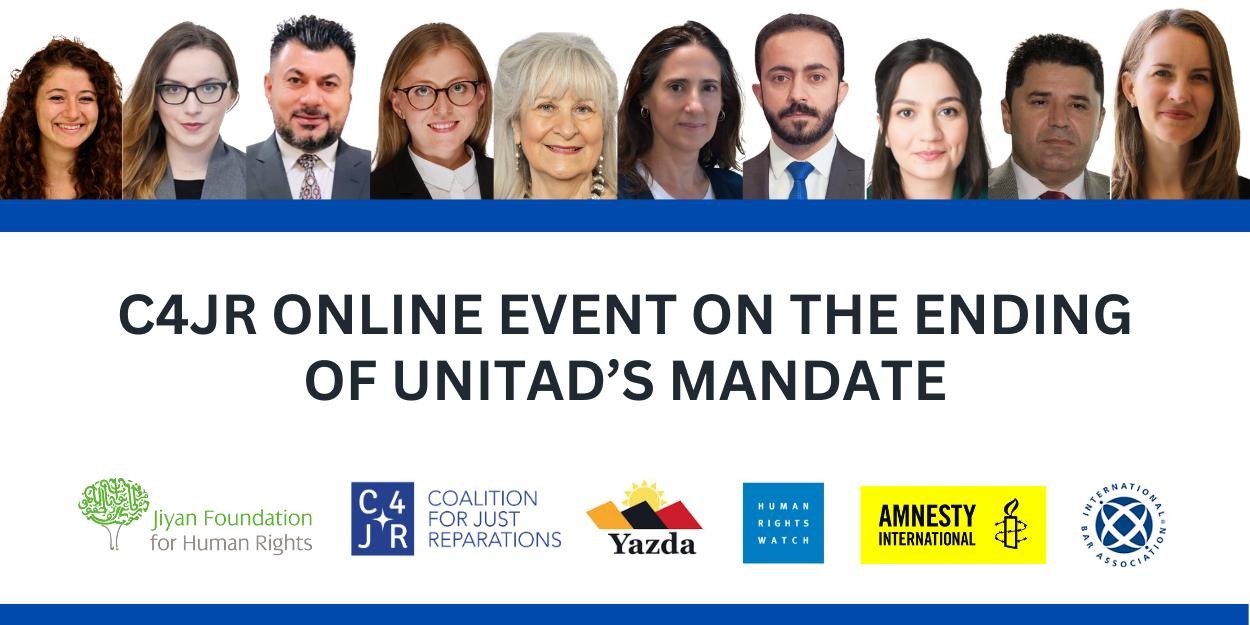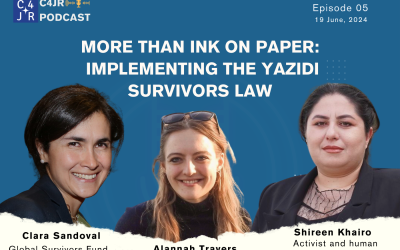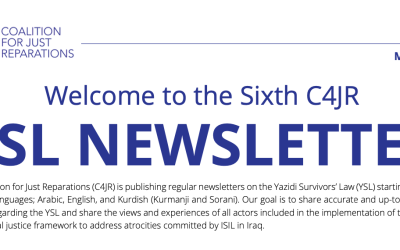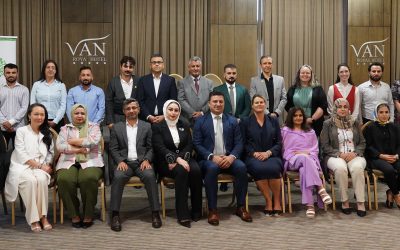On May 23, 2024, coinciding with the EU Day Against Impunity for Genocide, Crimes Against Humanity, and War Crimes, the Coalition for Just Reparations (C4JR) hosted a public online event to present its position paper on the ending of the UNITAD mandate in Iraq to a broader audience. The event, moderated by Jahaan Pittalwala, featured a distinguished panel of experts. A Keynote address by Baroness Helena Kennedy KC, Scottish barrister and Labour member of the House of Lords, was followed by an overview from C4JR’s Hasan Jameel, and a panel of speakers including Natia Navrouzov, Yazda Executive Director; Ana Peyró Llopis, Acting Special Advisor and Head of UNITAD; Dr. Dindar Zebari, KRG Coordinator for International Advocacy; Shireen Khudeda, member of the Yazidi Survivors Network (YSN). Following remarks were delivered by Sarah Sanbar, researcher at Human Rights Watch; Dr. Ewelina Ochab of the International Bar Association’s Human Rights Institute; Nicolette Waldman, Senior Crisis Advisor with Amnesty International; and Nadine Reiner, a lawyer at the Office of Amal Clooney. An audience Q&A followed, moderated by Alannah Travers:
The United Nations Investigative Team to Promote Accountability for Crimes Committed by Da’esh/ISIL (UNITAD) is scheduled for closure later this year, having been established under a 2017 resolution. UNITAD’s mandate has been to document and investigate crimes, collect evidence, and excavate mass graves. Despite these efforts, Iraq lacks the necessary legislation to prosecute the international crimes that UNITAD was designed to address. Furthermore, the transfer of evidence from a UN agency to a national jurisdiction requires assurances of fair, independent trials and adherence to UN standards, which Iraq has yet to provide.
C4JR emphasises the need for accountability, and an initial statement by C4JR, endorsed by 55 organisations, aimed to pressure Iraqi authorities to retain UNITAD. The Iraqi government has indicated intentions to pass relevant legislation, with the Prime Minister’s office saying it is drafting a law to prosecute international crimes, there are concerns about the adherence to a survivor-centred approach. Many victims are apprehensive to share evidence with authorities.
The UN Secretary-General released a report in January, setting out that the evidence cannot be handed directly to Iraq. The risk, therefore, is that this evidence will end up in an archive and/or unusable, unless a repository mechanism is created and – crucially – given resources to operate. In the May 23 online discussion, relevant actors highlighted the challenges and limitations of holding perpetrators of ISIS crimes accountable, including the lack of effective laws and political will in Iraq. They emphasised the need for continued accountability and securely preserving evidence. Speakers highlighted the importance of involving civil society and ensuring that survivors’ voices are heard. Please find their key suggestions below.
Next Steps: Ending of UNITAD‘s Mandate in Iraq
Coalition for Justice Reparations (C4JR) recommended actions:
- Advocate for embedding international crimes (war crimes, genocide and crimes against humanity) into Iraq’s legal system before UNITAD‘s mandate ends;
- Agree on a clear roadmap and conditions for the handling of evidence already collected and still to be collected by UNITAD before the mandate ends;
- The establishment a residual mechanism within the United Nations system to preserve copies of UNITAD‘s evidence as a safeguard;
- Ensure evidence collected can also benefit survivors through means other than just criminal prosecutions, for example in securing reparations under the YSL.
The following steps, suggested by the respective experts, aim to ensure that the termination of UNITAD‘s mandate does not hinder the pursuit of justice for the victims of ISIS crimes and that the collected evidence is used effectively to hold perpetrators accountable.
Secure and Preserve Evidence
Objective: Ensure that the evidence collected by UNITAD is preserved, accessible, and used effectively in future prosecutions.
- Establish a Residual Mechanism: Set up a UN-based mechanism to safeguard and manage the evidence collected by UNITAD. Suggested by Hasan Jameel and Baroness Helena Kennedy KC, and Nicolette Waldman, Amnesty International.
- UN and Iraq Mechanism: A mechanism that will continue the analysis of the evidence collected and continue to process requests post-September 17. Suggested by Natia Navrouzov.
- International Collaboration: Facilitate international cooperation to ensure the evidence is shared and used in line with international legal standards. Suggested by Dr. Ewelina Ochab.
- Legal Framework: Develop a clear legal framework for the storage, preservation, and management of evidence to maintain its integrity and usability. Suggested by Nadine Reiner.
- Digitisation of Evidence: Continue the digitisation and collection of evidence from various sources to ensure its longevity and accessibility. Suggested by Ana Peyró Llopis, UNITAD.
Legislative and Judicial Reforms in Iraq
Objective: Embed international crimes into the Iraqi legal system and improve the judicial processes for prosecuting these crimes.
- Criminalise Core International Crimes: Advocate for the passage of legislation in Iraq that criminalizes genocide, crimes against humanity, and war crimes. Suggested by Hasan Jameel and Dr. Ewelina Ochab.
- From an international law perspective, Iraq has an obligation to introduce effective laws for prosecuting ISIS fighters. One duty under the Genocide Convention is to punish, including introducing legislation criminalising genocide and ensuring effective prosecutions.
- Judicial Strengthening: Support Iraq in strengthening its courts and judicial system to handle international crimes effectively. Suggested by Baroness Helena Kennedy and Natia Navrouzov.
- The ongoing counter-terrorism trials are not the justice that the survivors are asking for. Therefore, the passage as soon as possible in Iraq of a law to criminalise core international crimes is a must. This, along with an international or hybrid tribunal, will ensure that ISIS crimes are addressed to their full extent, not only in a handful of trials in a few countries.
- Compliance with International Standards: Ensure Iraq’s judicial processes align with international human rights and humanitarian law standards. Suggested by Hasan Jameel.
Continued Support for Survivors
Objective: Provide ongoing support to survivors and ensure their needs are central to justice processes.
- Victim-Centred Approach: Ensure that justice mechanisms are survivor-centred, addressing their needs and perspectives. Suggested by Shireen Khero Khudeeda and Natia Navrouzov.
- Protection of Witnesses: Implement measures to protect witnesses and ensure their effective participation in trials. Suggested by Natia Navrouzov.
- Exhumation and Identification: Continue the exhumation of mass graves and the identification of remains, providing closure to families. Suggested by Natia Navrouzov and Shireen Khero Khudeeda.
Establishing a Prosecution/Judicial Mechanism
Objective: Develop mechanisms to prosecute ISIS members and ensure accountability for their crimes.
- International or Hybrid Tribunal: Reopen discussions on establishing an international or hybrid tribunal to prosecute ISIS members. Suggested by Natia Navrouzov.
- The reopening of discussions to create a mechanism to prosecute ISIS suspects, requesting Iraq and the international community to take concrete steps to establish a mechanism for prosecution that could utilise the evidence collected by UNITAD.
- Establishment of Specialised Courts: Advocate for the establishment of specialized courts to handle international crimes in the Kurdistan Region and beyond. Suggested by Dr. Dindar Zebari.
- Utilise UNITAD’s Evidence: Ensure that the collected evidence is utilized in future prosecutions, both within Iraq and internationally. Suggested by Nadine Reiner.
- One of the main challenges is ensuring that the evidence is not only preserved but also remains accessible and usable for future prosecutions. This involves maintaining a chain of custody and ensuring that the evidence is stored in conditions that prevent degradation. There needs to be a clear legal framework for how this evidence can be used in national and international courts. The risk of losing this evidence is significant, and steps must be taken to secure it properly.
- Coordination with Third States: Strengthen coordination with other countries to prosecute ISIS members who have fled Iraq. Suggested by Hasan Jameel.
- Global Strategy for Genocide Recognition: Advocate for a global strategy to recognize and prosecute genocide against the people of Iraq, including the Kurdistan Region. Suggested by Dr. Dindar Zebari.
Advocacy and International Support
Objective: Maintain international focus and support for justice and accountability in Iraq.
- Global Advocacy: Continue to advocate for international support and attention to the justice needs of ISIS survivors. Suggested by Dr. Dindar Zebari and Sarah Sanbar.
- Support from UN and International Bodies: Seek continued support from the UN and other international bodies to ensure justice and accountability, including the Office of the United Nations Secretary-General. Suggested by Ana Peyró Llopis and Nicolette Waldman.
- Amnesty International is calling on the Office of the United Nations Secretary-General to support justice, truth and reparations for crimes under international law committed by ISIS and the prosecution of those responsible for ISIS atrocity crimes, by carrying out a mapping process that would include a needs assessment of victims of crimes committed by ISIS in Iraq and Syria to understand what forms of justice and reparations solutions survivors want.
- Public Awareness: Raise awareness about the importance of justice for ISIS crimes and the ongoing needs of survivors. Suggested by Nicolette Waldman.
- Addressing Political Influences: Acknowledge and mitigate the impact of political influences on justice processes to ensure fair and impartial trials. Suggested by Sarah Sanbar.
- Thousands of trials have taken place post-liberation from ISIS, but many were marked by due process violations. People were often convicted based solely on affiliation with terrorist groups, without being charged for specific crimes like sexual violence. This has left many survivors without the justice they seek. Mass executions have been held in recent months in Iraq, which raises concerns about due process and the risk of wrongful convictions.
Monitoring and Reporting
Objective: Ensure transparency and accountability in the transition process and the continuation of justice efforts.
- Regular Reporting: Provide regular updates on the status of evidence preservation, legislative reforms, and judicial processes. Suggested by Ana Peyró Llopis and Nicolette Waldman.
- Monitoring Mechanisms: Establish mechanisms to monitor the implementation of recommendations and the progress of justice initiatives. Suggested by Nicolette Waldman.
- A mapping process by the Office of the UNSG would include reviewing the existing justice architecture in which IS members who allegedly committed crimes under international law can be brought to justice in fair trials, through local or international mechanisms, and develop a judicial solution for the remaining individuals who cannot be tried fairly in existing courts, particularly those held in north-east Syria; and identify gaps and opportunities to strengthen the justice architecture and collaboration across jurisdictions, exploring options for an international mechanism for prosecutions of crimes under international law, in line with international standards. This could also include establishing processes to facilitate the sharing of evidence and other pertinent information for trials.
- Continued Analysis of Evidence: Ensure the secure preservation and continued analysis of the evidence collected by UNITAD. Suggested by Dr. Ewelina Ochab.
The end of UNITAD’s mandate does not signify the end of the quest for justice for ISIS survivors. By taking these key actions, the international community and Iraqi authorities can ensure that the momentum towards justice and accountability continues, providing hope and support to those affected by ISIS crimes.
What will happen with the evidence and testimonies?
After UNITAD leaves, the handling of evidence and testimonies of ISIS survivors in Iraq will depend on several factors. Here are some potential scenarios and considerations:
Potential Scenarios:
1. Transfer to Local Authorities:
– UNITAD may transfer its collected evidence and testimonies to Iraqi judicial authorities. This would involve handing over all documentation, forensic evidence, and witness testimonies to ensure continuity in legal proceedings.
2. Collaboration with International Organisations:
– Other international organisations or bodies such as the International Criminal Court (ICC) might step in to assist in the preservation and utilisation of this evidence for ongoing and future prosecutions.
3. Establishment of Local Units:
– The Iraqi government might choose to establish specialised units or task forces within its judicial system to manage and use the evidence collected by UNITAD. These units would require training and resources to handle the evidence properly.
4. Involvement of NGOs and Civil Society:
– Non-governmental organisations (NGOs) and civil society groups like C4JR might take an active role in ensuring the evidence and testimonies are preserved and used effectively. They could also continue to support survivors and advocate for justice.
Considerations:
1. Preservation of Evidence:
– Ensuring the integrity and security of the evidence is paramount. This involves proper storage, cataloguing, and maintaining the chain of custody to avoid any contamination or loss of evidence.
2. Legal Framework:
– The Iraqi legal framework must be robust enough to handle the complexities of war crimes and crimes against humanity. This includes having laws in place that align with international standards for prosecuting such crimes.
3. Training and Capacity Building:
– Training local judicial and law enforcement personnel in handling and processing this type of evidence is crucial. This includes forensic analysis, witness protection, and legal procedures.
4. Witness Protection:
– Protecting the survivors who have provided testimonies is critical to ensure their safety and willingness to participate in legal proceedings. This might involve relocation programs, anonymity measures, and other forms of protection. Iraq has already passed the “Witness Protection Law Number 58” in 2017, but this law remains to be effectively activated.
5. Ongoing Support for Survivors:
– Continued support for survivors, including psychological, medical, and legal assistance, is necessary. This helps in their rehabilitation and ensures they can participate in the justice process without additional trauma.
6. International Oversight and Support:
– Continued international oversight and support might be necessary to ensure that the process remains transparent and that justice is served. This can come from international human rights organisations, UN bodies, and others committed to justice and accountability.
What about the mass graves that are still not exhumed?
The departure of UNITAD raises significant concerns about the future of the mass graves in Iraq that remain unexhumed. Here are some potential outcomes and considerations:
Potential Outcomes:
1. Delayed Exhumation Efforts:
– Without UNITAD‘s resources and expertise, the process of exhuming mass graves might slow down significantly. Local authorities might lack the necessary technical skills, funding, and equipment.
2. Local Government Efforts:
– The Iraqi government and regional authorities might attempt to continue exhumation efforts. They may seek assistance from other international organisations or countries willing to support these efforts.
3. Involvement of NGOs:
– Non-governmental organisations (NGOs) and other civil society groups might step in to fill the void left by UNITAD. These groups could play a crucial role in continuing the work of identifying and exhuming mass graves.
4. International Support:
– There could be renewed calls for international support and funding to ensure that the work of exhuming mass graves continues. Other UN bodies or international coalitions might take on some of the responsibilities.
5. Legal and Forensic Challenges:
– The lack of UNITAD’s expertise might lead to challenges in maintaining the standards required for forensic and legal processes. This could impact the identification of victims and the prosecution of perpetrators.
Considerations:
1. Training and Capacity Building:
– Efforts should be strengthened to train local forensic teams and authorities to handle the exhumation and identification processes professionally and independently, such as the work that The International Commission on Missing Persons (ICMP) has supported Iraqi authorities with. This would include technical training in forensic archaeology and anthropology.
2. Funding and Resources:
– Ensuring that there are adequate funds and resources for the continuation of these efforts is crucial. This might involve seeking international grants, donations, or other forms of financial support.
3. Documentation and Preservation:
– Proper documentation and preservation of evidence from mass graves are essential for future prosecutions and for the historical record. This requires meticulous planning and expertise.
4. Victim and Community Support:
– Providing support to the families of victims and the communities affected by these atrocities remains important. This includes psychosocial support, legal assistance, and ensuring their involvement in the exhumation process.
5. Advocacy and Awareness:
– Raising awareness about the importance of continuing these efforts can help garner international attention and support. Advocacy by human rights organisations and survivors’ groups can be pivotal in maintaining momentum.
The situation requires coordinated efforts from the Iraqi government, international organisations, and civil society to ensure that the work of exhuming mass graves and seeking justice for the victims continues effectively.




